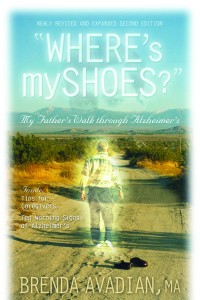Holidays give us a good reason to get together with family and friends.
If we observe carefully, we may notice changes in our parent’s behavior, in his/her housekeeping, and cognition.
It was 15 years ago when my husband and I realized my father could no longer live alone safely. After trying to patiently persuade him, after three years, he finally agreed to visit us in California. One week later, he and I boarded a plane for a one-way trip from his Wisconsin home of 45 years to our home in California. –Brenda Avadian
What do we look for?
Dr Amy D’Aprix,* who works with caregiving families, says there are several things to look for.
Your loved one’s Medical Condition
My father’s dementia was causing him to become disoriented; otherwise, he was healthy and on no medication.
Home safety practices
During the cold winter months in Wisconsin, my father would tuck an old space heater (with a frayed electrical cord) under his blanket “to warm up the bed” before he got in.
Mood and Attitude
My father remained in good spirits; especially, when he had visitors.
Signs of abuse
After sitting with him and listening, he began to feel freer and shared his fears about losing his home. My brother insisted it was his. It wasn’t.
Driving
My father stopped driving after he lost his car. Until then, there were plenty of police reports.
What else I found while visiting my father:
Old and expired food.
I removed an old sticky plastic bag of pink rice from the kitchen cabinet.
I tossed the expired orange juice and milk that was in his refrigerator. Sadly, there was nothing else inside.
He had forgotten familiar people (family, friends, neighbors).
My father thought I lived in the neighborhood…well, yes, if the neighborhood is about 1,800 miles!
He neglected his bathing and grooming.
My father showered and shaved twice a day. When I saw him again six months later, he had not showered or changed his clothes.
Something had to be done.
I was venturing into new territory. To make sense of it, I kept detailed notes in a folder on my computer. (Today, we can sync these notes onto our smart phones for easy portability.)
While I was a long-distance caregiver, I called and met with the professionals in Milwaukee to gain more knowledge about my father’s condition and what to expect. Their advice helped me to get legal documents in place including a power of attorney in order to initially get access to his medical records.
 Ultimately, given the choices we had, my husband and I moved my father into our home in California. We believe intervening in my father’s life gave him an extra five years.
Ultimately, given the choices we had, my husband and I moved my father into our home in California. We believe intervening in my father’s life gave him an extra five years.
For the entire story–before, during, and after–read “Where’s my shoes?” My Father’s Walk through Alzheimer’s
Brenda Avadian, MA
Alzheimer’s / Dementia Caregiver, Expert Spokesperson, Coach, and Author
Editor, TheCaregiversVoice monthly Newsletter and The Caregiver’s Voice Book Review
* Dr. Amy D’ Aprix presented a workshop sponsored by Home Instead through the American Society on Aging.
Additional Resource:
Holiday Spy Kit: 8 Clues Your Aging Parents Aren’t OK | Caring.com [TCV update 7/4/2025: This caring.com URL is no longer available.]









Keep in touch with your loved more regular, and visiting if only for an hour here and there makes the world of difference to some one’s life.
Yes Jon. Definitely true. If we stay involved in our loved ones’ lives we can better monitor their progress. Although, I didn’t mention it (and I should have), using the holidays to observe, is more for long-distance relationships.